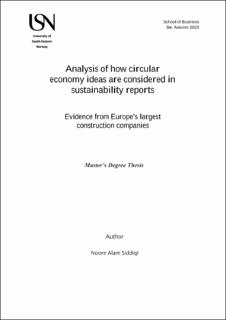Analysis of how circular economy ideas are considered in sustainability reports; Evidence from Europe's largest construction companies
Master thesis
Permanent lenke
https://hdl.handle.net/11250/3110254Utgivelsesdato
2023Metadata
Vis full innførselSamlinger
Sammendrag
The European construction industry is a pivotal player in the global economy, and its approach to sustainability is crucial for our planet's future. This master's thesis delves into the intersection of these two vital areas by analyzing sustainability reporting practices within Europe's top thirty construction companies. The focus is on how these companies incorporate the concept of the circular economy—a 21st-century innovation deeply linked to sustainability—into their reports.
Initially, the thesis undertakes a theoretical analysis to explore the history, current status, quality, and existing research in sustainability reporting. This sets the stage for a quantitative study that sheds light on how European construction firms address circular economy in their sustainability reports, with a specific emphasis on circular economy principles.
Subsequently, a case study is conducted to gain a deeper understanding of the challenges these firms face in integrating circular economy concepts into their operations. The thesis also includes a discourse analysis of the sustainability reports of thirty construction firms, aiming to dissect how they communicate their sustainability and circular economy strategies to stakeholders.
Employing a data triangulation method, this study seeks to uncover any shortcomings or gaps in current sustainability reporting practices. It aims to provide meaningful insights into both the discourse surrounding circular economy reporting and the practical challenges of implementing these principles in the European construction sector. This research aspires to make a significant contribution to the field by offering a comprehensive analysis of sustainability reporting and circular economy implementation within the European construction sector.
